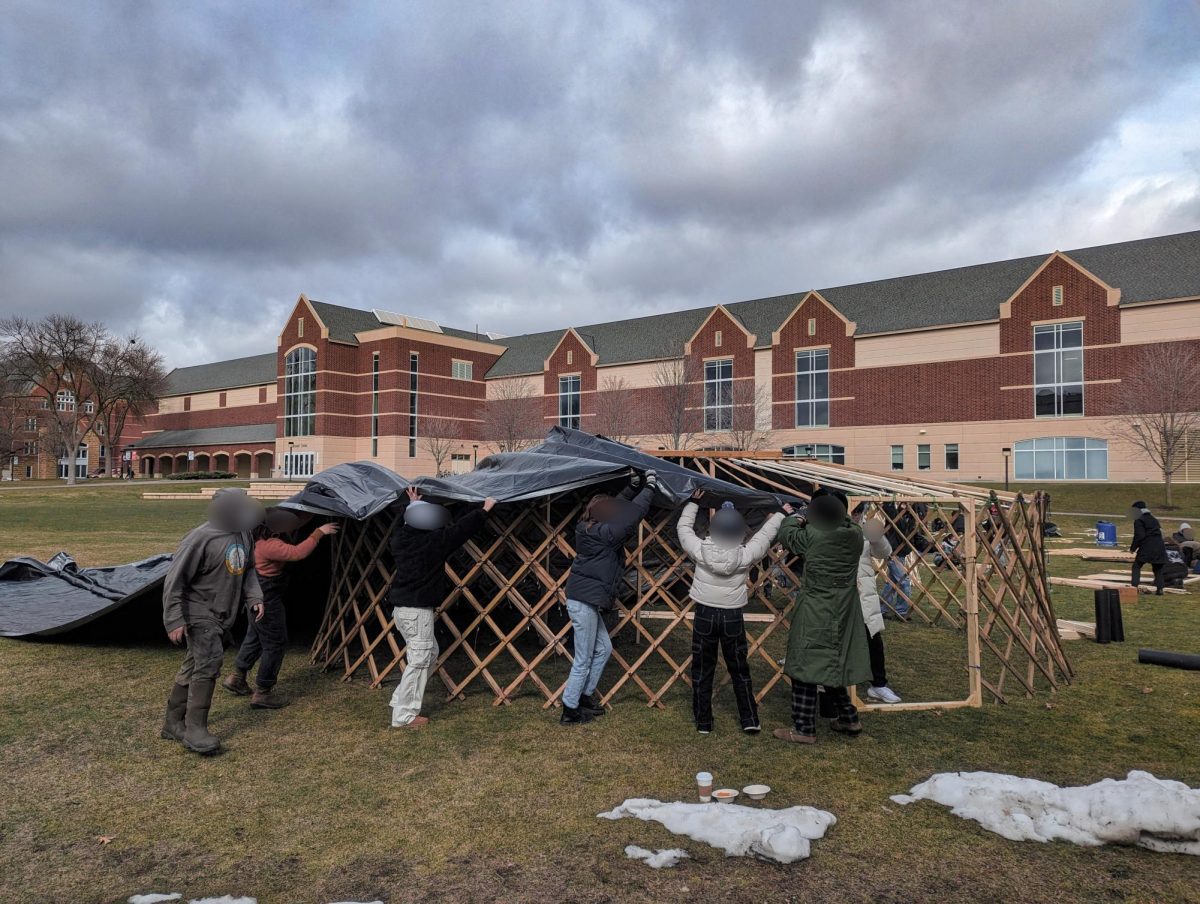
In preparation for the record-breaking class, Residential Life, dining spaces, campus-wide budgets and Mailing Services all made new changes.
Before its move-in day, Residential Life and Facilities spent the summer refitting the living spaces for the newcomers. Director of Residential Life Coco Du said that the surprising size of the class called for some reimagining of the dorm spaces.
“In Dupre, Doty and Turck, we were able to take some common spaces offline, meaning study rooms and lounges traditionally, and worked with facilities to essentially retrofit those and convert them into student rooms,” Du said. “A lot of things were done including painting, soundproofing, insulation, privacy blind installation and lighting and furniture to make sure that those spaces feel like rooms, or the equivalent of that versus, like, ‘Oh, I walked in and I know that this is a lounge.’ So we were able to do those and then fitting in the additional 20-plus students.”
In addition to the redesigning of the traditional first-year communities, Residential Life also expanded the community outside of its traditional boundaries.
“We were able to shift some sophomores around to create Bigelow first floor, open ten beds and create an intentional first-year community,” Du said. “It was also important for the first-years to be able to live with their peers so they feel like they’re still in this together. And Bigelow just being next door to Doty and Turck, it still kind of feels very much like the expansion of the first year community.”
Space changes were made to dining areas as well. In an email sent to the student body on August 29, Dean of Students Jim Hoppe wrote, “we’ve added new tables to the north side of Cafe Mac to accommodate an additional 45 people at mealtimes.” Popular food items were also centralized in order “to help alleviate and re-route traffic.”
More bodies on campus not only require more space, but larger budgets as well.
In preparation for first-years’ involvement with campus life, certain budgets and staff numbers have been increased, hopefully to the benefit of all students, Hoppe said.
“We’ve added staff to the counseling center and health center and we’ve added money to budgets to make sure there’s enough money to program the events. If Campus Activities is going to have ‘x’ number of more people coming to campus events and we want to make sure they can handle that food-wise and logistics-wise, [we want to make sure that] folks that are in clubs sports and other teams can be transported in a safe way, and MCSG will have more money to allocate for clubs and orgs,” Hoppe said.
While the first-year class has motivated many additions to campus, their presence has also restricted some campus experiences. There are no longer accommodations for every student to have a Student P.O. (SPO) box this year. The first year class has left Residential Life unable to house the six new transfers students to Macalester this year, a service they normally provide.
Zach Malett ’18 was one of the six told in his acceptance notice that he wouldn’t be given the option of residential life at Macalester. While Residential Life did point him to the “Off Campus Housing Listings” on their website, he found the resource “not at all helpful” and out of date.
Malett said he was lucky to find a better resource in his roommate, another transfer student from the Twin Cities area.
“Honestly, I have no idea what I would have done if I hadn’t found my roommate [through the transfer group] because he just did everything, basically, and could actually see the apartments and send me pictures. You know, if it was someone from another state like myself, I don’t know what we would have done,” Malett said.
While Malett said he’s adjusting to apartment life and the welcome addition of some more personal space, he does still wish he had been given the social opportunities that residential life lends.
“One big [downside] is just not being able to walk into the hall and meet people that way, or you know, like little bonding things like ‘where’s the trash?’ or ‘how does this door work?’. Things like that can spark conversations,” Malett said.
Despite the numerous changes, campus life with the additional students has gone smoothly, according to Hoppe.
“I’ve got to be honest, I haven’t heard a ton of feedback as it relates to class size, neither positive or negative. And you usually hear the negative, you don’t always hear the positive,” Hoppe said.
Macalester may have proven its adaptability by adjusting quickly to the influx of first-years, but Du, Hoppe and Allen all say they believe that the class size and changes shouldn’t be viewed as a prediction of a larger trend at Macalester.
“My sense is that [the large class this year] wasn’t an intentional push to get bigger and so at some point, every class is like a bubble that has to work it’s way through the pipe and we’ll eventually recalibrate to a little smaller again,” Hoppe said.
“I think there’s definite significant interest in exploring ways to strategically and in a planful way, decrease the size of the overall student body, and that would mean that there would be a lower incoming class target that perhaps we’ve had in previous cycles. The question would be to what degree and to what extent,” Allen said.
“I think in the long term our desire is for the number to go down. Of course Res. Life does not admit students so we need to work with admissions on the number,” Du said.
“You know, if we have five more extra people come in next year, we can probably make that work. But if we’re talking about adding another 20, there’s no way we’re able to accommodate that. So that would be a bigger, much larger conversation about how do we continue to meet the needs of students and really making sure that each of you feel like you are more than just another number and that you get what you need from living and learning with us.”














Amanda Short • Sep 11, 2019 at 9:31 am
You could certainly see your enthusiasm within the work you write. The sector hopes for even more passionate writers like you who are not afraid to say how they believe. At all times go after your heart.
Angela Davidson • Sep 10, 2019 at 4:15 am
Wow, this post is pleasant, my sister is analyzing these kinds of things, therefore I am going to tell her.
Amanda Parr • Sep 8, 2019 at 2:05 pm
I have seen many useful elements on your web-site about desktops. However, I have the view that laptop computers are still not nearly powerful adequately to be a sensible choice if you generally do projects that require a lot of power, including video enhancing. But for web surfing, word processing, and majority of other popular computer work they are fine, provided you never mind small screen size. Many thanks sharing your ideas.